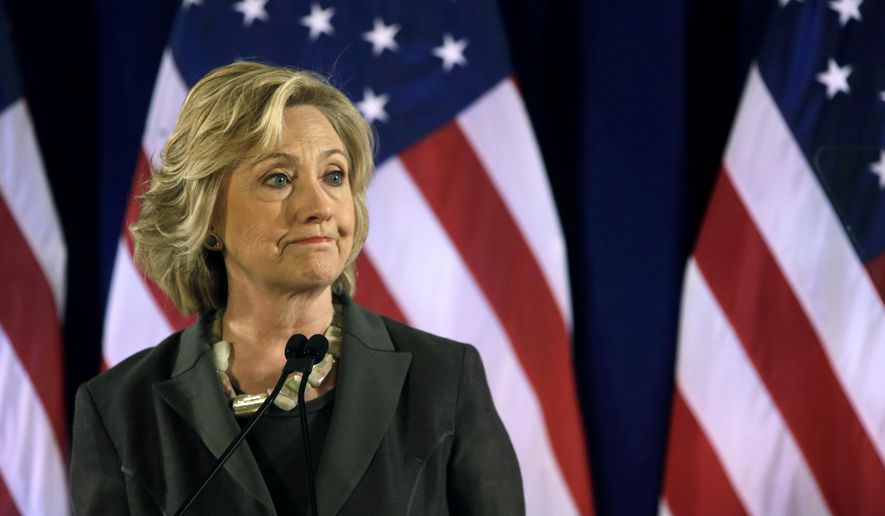The Obama administration slapped a secret designation Friday on a number of Hillary Rodham Clinton’s emails from her time as secretary of state, raising more questions about whether her controversial email arrangement led to classified information being left unsecured.
A new tranche of Clinton emails, released by the State Department under a court order to impose transparency on the Obama administration, contains dozens of documents with information redacted and labeled either “confidential” or “sensitive.”
The classifications generally appear to have been done on Thursday, a day ahead of the release, which means the information wasn’t necessarily classified at the time Mrs. Clinton was emailing about it — but has now been deemed too sensitive to put out in public.
According to the exemptions cited in the redactions, the data is usually either information obtained from a foreign government or internal foreign policy information from the U.S. government.
For example, one July 19, 2009, email from Huma Abedin to “H” — Mrs. Clinton — says “Please pass to S:” and then the body of the message is completely redacted, with both the foreign information and internal foreign policy exemptions cited: “Classified by DAS, A/GIS, DoS on 07/30/2015 — Class: CONFIDENTIAL — Reason: 1/4(B), 1.4(D) — Declassify on:07/19/2019.”
Another email, marked “SENSITIVE BUT UNCLASSIFIED” at the time it was sent in 2009, but now deemed to contain fully classified information, teases information about “two embassy security issues” — but the actual issues are redacted from the document.
SEE ALSO: Hillary Clinton email release falls well short of judge’s order
The emails posted Friday were the third major release from the cache of more than 30,000 emails that Mrs. Clinton turned over to the State Department last year, shedding new light on her official communications that were hidden from Congress and the public for years.
Those national security concerns are also hitting the State Department, which admitted Friday that it was violating a judge’s order in releasing only 1,356 new emails from Mrs. Clinton’s time in the administration, saying it’s falling behind because it has to run all those documents by intelligence agencies to make sure classified documents aren’t being released.
Mark Toner, a spokesman for the State Department, acknowledged they were violating Judge Rudolph Contreras’ order requiring 2,400 new messages to be released by July 31.
“We fell short this month,” Mr. Toner said. “We’re going to catch up.”
The State Department had originally asked to release all of the emails early next year, but Judge Contreras rejected that, saying the department should release more every month, in the interests of transparency, until they are all released by January.
Mr. Toner said the department still intends to meet the final January deadline, but is slipping on the monthly deadlines — suggesting the administration is defying the judge’s schedule in favor of sticking with its own original goals.
SEE ALSO: Hillary Clinton’s doctor says 2016 candidate in ‘excellent’ health
Mrs. Clinton, the front-runner for the 2016 Democratic presidential nomination, has insisted that she followed all the rules and never handled classified information with her private email account, which was hosted on a private email server located in her home in Chappaqua, New York.
However, independent government auditors last week said that they found classified information in at least four of Mrs. Clinton’s emails and requested a Justice Department investigation.
Mrs. Clinton had initially said she never handled classified information on the email account, but has since narrowed that defense, saying none of the information was “classified at the time.”
The former first lady, senator and top diplomat did not turn over her stash of emails until nearly two years after she left office, after a congressional probe learned about her private email account.
Mrs. Clinton handed over about 30,000 messages to the State Department and erased another 32,000 messages that she deemed personal. At some point, she wiped clean the email server, preventing any of the messages from being recovered.
• Stephen Dinan can be reached at sdinan@washingtontimes.com.
• S.A. Miller can be reached at smiller@washingtontimes.com.




Please read our comment policy before commenting.